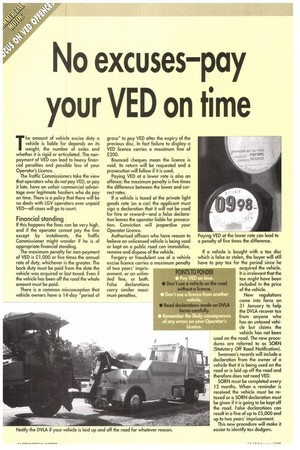No excuses pay
Page 46

If you've noticed an error in this article please click here to report it so we can fix it.
your VED on time The amount of vehicle excise duty a vehicle is liable for depends on its weight, the number of axles and whether it is rigid or articulated. The nonpayment of VED can lead to heavy financial penalties and possible loss of your Operator's Licence.
The Traffic Commissioners take the view that operators who do not pay VED, or pay it late, have an unfair commercial advantage over legitimate hauliers who do pay on time. There is a policy that there will be no deals with LGV operators over unpaid VED—all cases will go to court.
Financial standing
If this happens the fines can be very high, and if the operator cannot pay the fine except by instalments, the Traffic Commissioner might wonder if he is of appropriate financial standing.
The maximum penalty for non-payment of VED is £1,000 or five times the annual rate of duty, whichever is the greater. The back duty must be paid from the date the vehicle was acquired or last taxed. Even if the vehicle has been off the road the whole amount must be paid.
There is a common misconception that vehicle owners have a 14-day "period of grace" to pay VED after the expiry of the previous disc. In fact failure to display a VED licence carries a maximum fine of £200.
Bounced cheques mean the licence is void. Its return will be requested and a prosecution will follow if it is used.
Paying VED at a lower rate is also an offence; the maximum penalty is five times the difference between the lower and correct rates.
If a vehicle is taxed at the private light goods rate (as a car) the applicant must sign a declaration that it will not be used for hire or reward—and a false declaration leaves the operator liable for prosecution. Conviction will ieopardise your Operator Licence.
Authorised officers who have reason to believe an unlicensed vehicle is being used or kept on a public road can immobilise, remove and dispose of the vehicle.
False declarations carry similar maximum penalties. If a vehicle is bought with a tax disc which is false or stolen, the buyer will still have to pay tax for the period since he acquired the vehicle. It is irrelevant that the tax might have been included in the price of the vehicle.
10 PONDER
New regulations came into force on 31 January to help the DVLA recover tax from anyone who has an untaxed vehicle but claims the vehicle has not been used on the road. The new procedures are referred to as SORN (Statutory Off Road Notification).
Swansea's records will include a declaration from the owner of a vehicle that it is being used on the road or is laid up off the road and therefore does not need VED.
SORN must be completed every 12 months. When a reminder is received the vehicle must be retaxed or a SORN declaration must be given if it is going to be kept off the road. False declarations can result in a fine of up to £5,000 and up to two years' imprisonment.
This new procedure will make it easier to identify tax dodgers.




















































































































